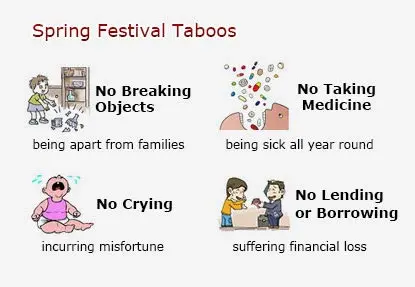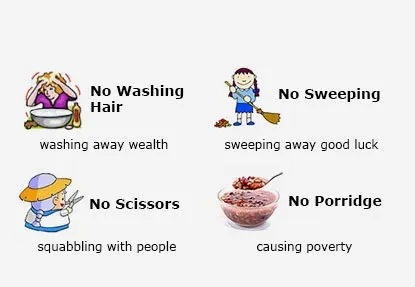The date is different each year on the Gregorian (internationally-used) calendar, but is always between January 21th and February 20th.
The Official Holiday — 7 Days
The standard public holiday for (Mainland) Chinese is the 7 days from Chinese New Year's Eve to day 6 of the lunar calendar new year (January 27 – February 2, 2017).
To Get 7 Days Off Chinese Work Weekends!
Officially only the first three days of Chinese New Year are statutory holiday. Chinese must work the two weekend days closest to the statutory holiday to "make up the work time".
The Most Important Dates of Chinese New Year
Chinese New Year's Eve: the day of family reunions
On a Chinese calendar: 除夕 Chúxī /choo-sshee/ 'getting-rid-of evening'
Chinese New Year's Day: the day of (close) family visits and New Year greetings
On a Chinese calendar: 初一 Chūyī /choo-ee/ 'first 1'
The Traditional Holiday Period — 23 days
An Early Start to Celebrations
Traditionally new year activities may as early as three weeks before Chinese New Year's Eve, but a week before is more usual.
Traditional (mostly rural) folk start cleaning their houses to welcome a new year from the 23rd of the twelfth lunar month (January 20, 2017).
A Later Finish to the Holiday
Traditionally the end of the Spring Festival (the Chinese New Year holiday) is the Lantern Festival — Chinese month 1 day 15 (February 11, 2017). Then beautiful lanterns are displayed and sweet rice dumpling soup is eaten.
We have more detail on day-by-day activities for this grandest of Chinese festivals.
2017 Is a Rooster Year!
Chinese New Year 2017 begins a year of the Rooster. It's considered a bad year for "Roosters": people born in a Rooster year.
Read more on the personality, career, and love life for Rooster year people, and other Chinese zodiac traits by clicking on the links in the table below.
Chinese New Year Dates for This Chinese Zodiac Cycle
| Year | Chinese New Year Date | Day of the week | Zodiac Animal |
|---|---|---|---|
| 2016 | February 8 | Monday | Monkey |
| 2017 | January 28 | Saturday | Rooster |
| 2018 | February 16 | Friday | Dog |
| 2019 | February 5 | Tuesday | Pig |
| 2020 | January 25 | Saturday | Rat |
| 2021 | February 12 | Friday | Ox |
| 2022 | February 1 | Tuesday | Tiger |
| 2023 | January 22 | Sunday | Rabbit |
| 2024 | February 10 | Saturday | Dragon |
| 2025 | January 29 | Wednesday | Snake |
| 2026 | February 17 | Tuesday | Horse |
| 2027 | February 6 | Saturday | Goat |
Why Chinese New Year Is on the Dates It Is
Like Christmas/New Year in other countries, Chinese New Year is simply a much-needed winter holiday at an auspicious time.
Rest Before a New Farming Year
Chinese New Year was set to coincide with the slack time just before a new year of farm work begins, as a time of preparation.
When most Chinese were farmers this made sense. Now 55% of China's population is urban (a generation ago it was 25%), but 100+ million return to their rural roots for CNY.
Chinese traditionally celebrated the start of a new year of farm work, and wished/prayed for a good harvest. This has now evolved into celebrating the start of a new business year and wishing for profits and success in various vocations.
The Traditional 'Start of Spring'
China's traditional solar calendar's first solar term is called 'Start of Spring', hence the "Spring Festival" — another name for Chinese New Year.
'Start of Spring' precedes the start of spring weather for much of China, starting about February 5, and the lunar calendar year always starts within half a month of that.
http://www.chinahighlights.com/travelguide/festivals/spring-festival/chinese-zodiac-years-of-2011-to-2020.htm
At the start of a Lunar New Year, Chinese people will take their daily practices as predictive signs for the coming year. Many bad words like "death", "broken", "killing", "ghost" and "illness" or "sickness" are forbidden during conversations. Crying, washing, lending and taking medicine are also considered unlucky.



No comments:
Post a Comment